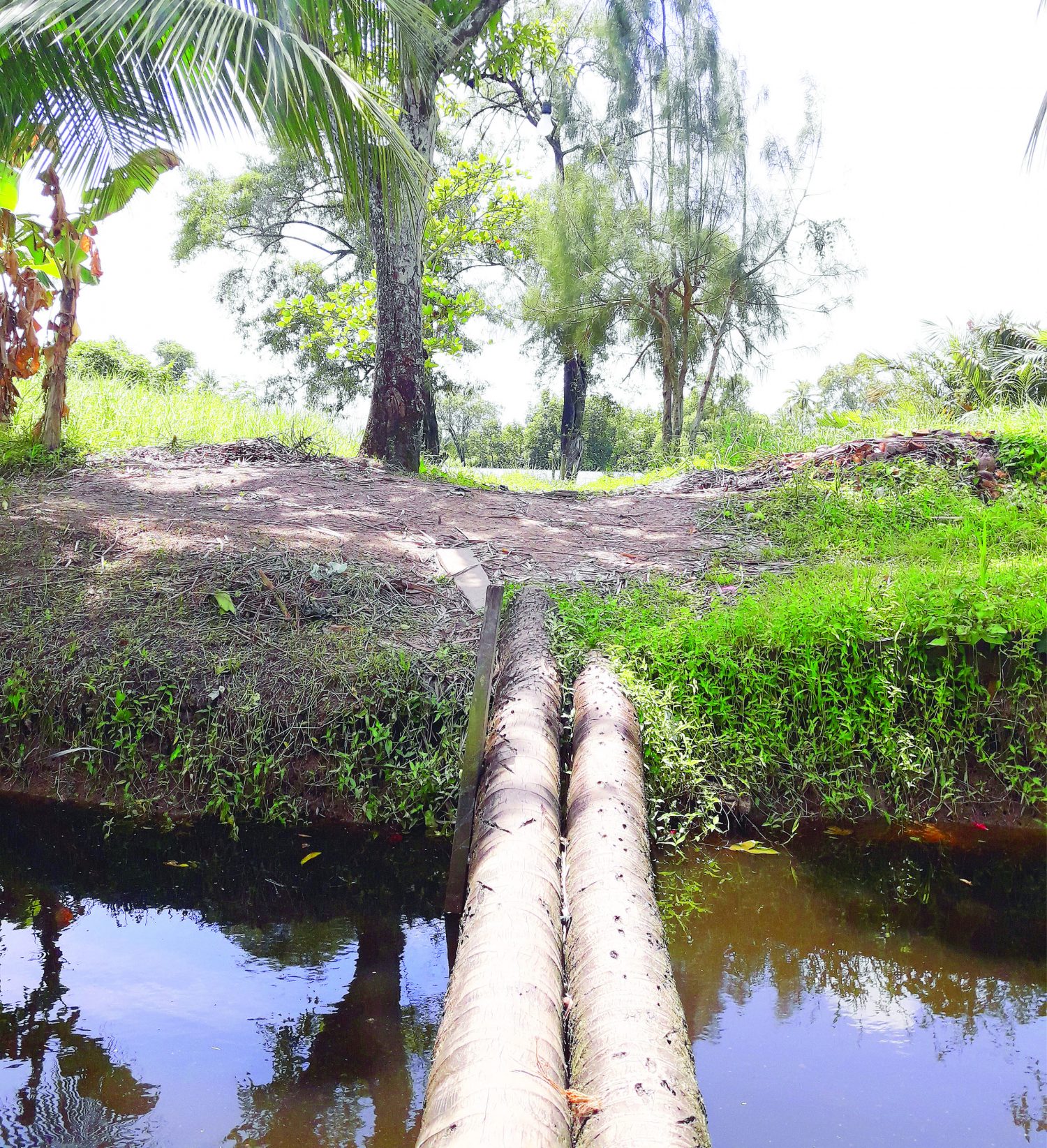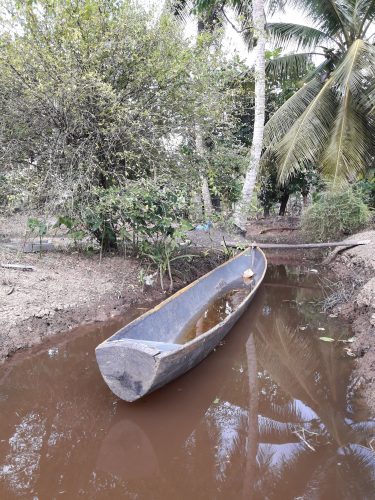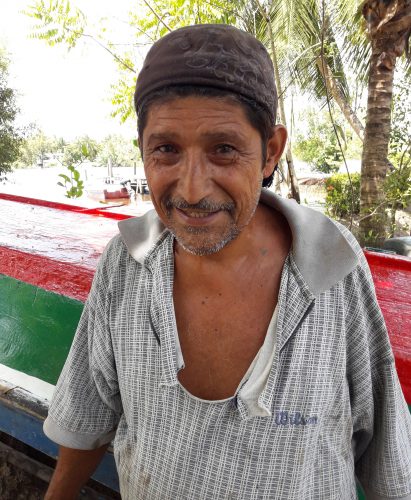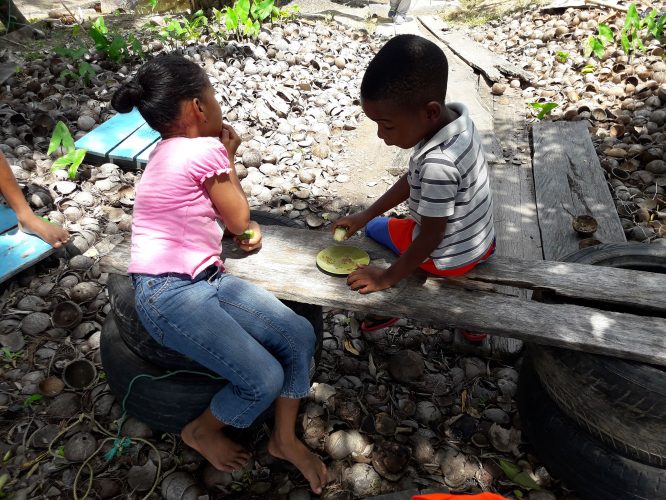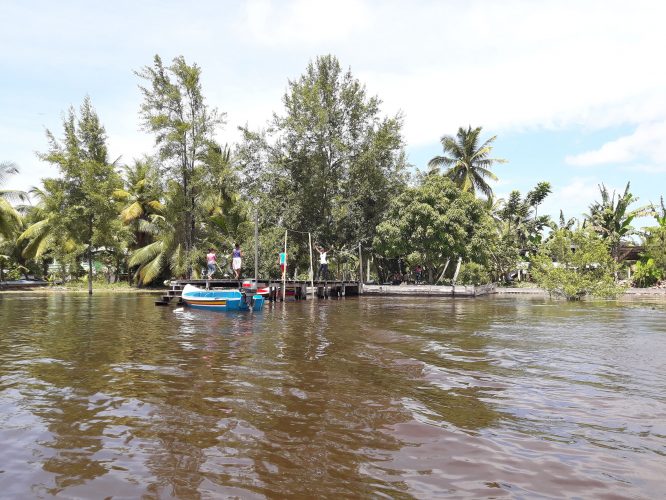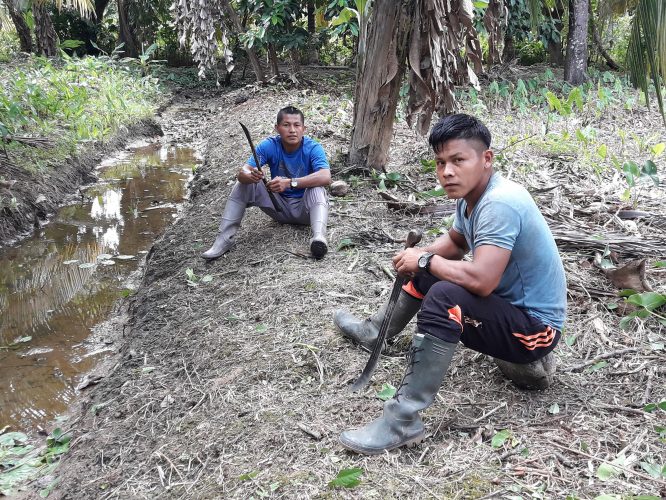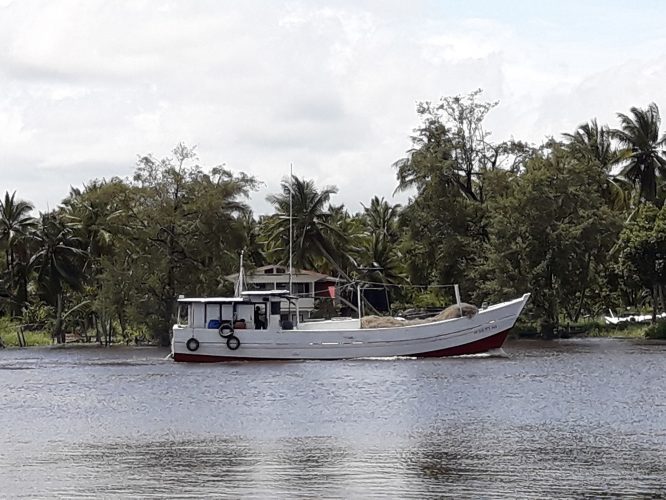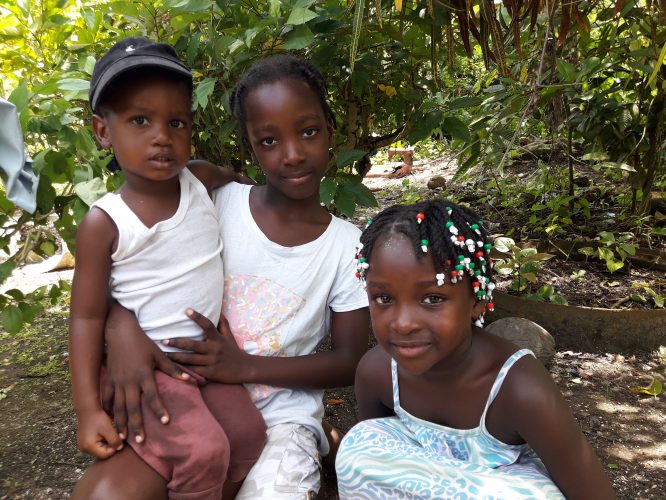Bel-Air and Dublin are grants in the Pomeroon River, approximately nine miles from Charity on the Essequibo Coast and home to some 25 persons. These two grants fall on the same side as Charity but can only be accessed by boat.
A friend of mine who lived on one of these grants in the Pomeroon River some years ago, opted to be my guide for the part of the day. From him I learnt that there are some things you never say or do as they are considered silly and you might just turn out to be the laughing-stock of the day. For example: you never call the grants villages or communities or neighbourhoods; you do not wear life jackets; when your hands get sticky from having coconut water and jelly, you do not ask where you can wash them when there is an entire Pomeroon River and black water drains everywhere; you do not ask if women and children can drive a boat because just about everyone can. Some of the things you always do: wave at someone when passing by in a boat and always remember your courtesies. I did and said them all: the ones I was supposed to do and the ones I was not supposed to.
On the way to the grants, we passed children sitting on landings, women working between huge piles of coconuts, families washing clothes and children taking baths. One young man was far out on his landing to get a network signal while making a phone call. Boats traverse the river, back and forth.
Grants are huge plots of land, used for farming purposes. Bel-Air and Dublin are accessible to each other by mud tracks so that there few residents can be considered neighbours. Both grants are said to have been in existence for hundreds of years. The main economic activities are farming and boat building.
Under the shade of trees, 58-year-old Anthony Doliveira was putting a coat of green paint on his boat. He has lived in Dublin his entire life and has known only hard work.
Doliveira’s parents originated in Grant Belfield. They raised eight children in Dublin – four boys and four girls. Most of their lives, he said, they toiled in the
backdams. They planted coconuts, bananas, plantains, cash crops and fruits which his parents sold at the Charity Market.
Doliveira said just about everyone knows to swim. He cannot recall when he first learned, but said it was at a really young age. The children, he said, would hold on to the corners of the land or floaters, mostly Styrofoam, until they feel confident enough to let go. Asked about dangers in the water, the man mentioned caimans but more so the piranhas, showing me a toe that was bitten off by one. This led to a number of mysterious stories.
“Years ago, my father and mother used to go to sell produce and when them coming back I used to go for them at Charity, Doliveira said. “That time there was hardly any boat in the area and people who had use mostly the 15 feet boat with a number six horse power outboard engine. I went with a 24 feet boat and a six horse power outboard engine. After picking up my parents and dropping them off, me and my brother continue on to drop off the rest of people in the boat. We reach at a wooden koker where I had to drop off a man and while going in, there was this thing sitting on the koker and splashing about, but when we got close enough, it jump overboard. People in the boat strike their light to look for it but we didn’t see anything so one lady ask the man we put off if he son didn’t just bathing cause he take a long time to float up back; that’s when the man said, it’s a mermaid. He tell we that every night they does come up to bathe and comb their hair. He mek me get scared. At the next landing, another one jumped overboard and that’s when I was sure there was mermaids.
“My father always tell me a story that happen during his time. He said, it had two old grandparents who was living with their grandson in a troolie hut. One night the old man came home late; he was drunk so he went straight to bed. Later in the night the old lady wake up hearing the dogs barking; then she heard the troolie tearing and cutting and she hurry to where the little boy does sleep but he wasn’t in his bed and there was a big hole in the troolie. They bring the police and they find drag marks disappearing into the jungle. A month later a letter from the boy reach to tell the grandmother that she mustn’t worry and that he was okay and will send money for her. The money used to come. A year or so later, he come to visit she and she beg him to tell he where he was and he beg her not to ask him because ‘they will kill he’. She didn’t bother he and he went away and come back another time to visit. She beg he again and knowing that they will kill he, he still tell she. He tell she that two white ladies tek he and carry he away with them and promise that they will look after he and send money for the old people if he stay with them, but will kill he if he only talk. One day he went fishing at a koker and didn’t come home; the old people find he with he neck break.”
He also said that it has been years since anything like this has happened and he believes it is because the place has gotten brighter. Doliveira had many more mermaid stories, as well as stories of kanaimas, a massacura man he claimed to have seen himself, and of jaguars venturing into the grants and carrying off hunting dogs and other domestic animals.
“The country life is nice,” said Doliveira.
Communication is trying, though. The network signals are poor, and residents sometimes have to walk to the end of their landings or climb trees to make calls.
They don’t get potable water, so most persons catch rainwater for drinking and cooking purposes. The river is used for washing of utensils, laundry and bathing. Sometimes, though this is rare, Doliveira said, there is no water and people are forced to drink the river water using rocks and sand to filter it.
Dublin has no electricity and so many persons use generators. Doliveira hopes the government can do something about this since it costs almost $1,000 for a gallon of gasoline.
Dexter Cameron was working at his residence in Bel-Air. His mother had died the previous day and he and some other men from the grants around were busy with funeral preparations.
Cameron is a farmer and an elder of the Friendship/Canal Seventh Day Adventist Church. He was born on another grant, but his parents moved to Grant Bel Air in 1966 when he was just six years old. “We farmed bananas, plantains and coconuts,” he said.
We sat on a makeshift bench he had just made out of a piece of wood and some tyres. All around were thousands of coconut shells. Cameron sells coconuts to vendors, but all of the rejected ones were left right there, and people would go and pick through them to find those they could use to make coconut oil.
Cameron had a sister who drowned years ago and rumour was that it was because of some mysterious water creature. But Cameron, who was away at the time and didn’t witness the event, said that based on what eyewitnesses had said, his sister, who was in her early 20s, was crossing the river in her canoe when the water began going around in circles. Persons told him that their dog was in the boat with her when the boat capsized, and she was swimming to land but eventually went down; he believes it was exhaustion and does not believe in mysterious water creatures.
People still drown here, he said, but it is rare; those who do were likely imbibing. Many drownings, he said, occurred in the 1970s and before. However, one of the saddest events was some years ago when a boat capsized with children heading home from church. Though persons hurried to their rescue, unfortunately they could not save them all.
It is common to see children piloting themselves to school in riverain areas, but most parents take the responsibility of doing so in the grants, Cameron noted. The closest schools are Regina Nursery and Marlborough Primary, situated on other grants. The closest secondary school is located at Charity. School begins at 8 every morning and finishes at 2.30 in the afternoon.
Living in Bel-Air, Cameron said, is a blessing. Some advantages he mentioned are: crime rate is low, the cost of food is cheap and most importantly, it’s a “homey place”. The man noted that any occasion, good or bad, people arrive by boats to assist each other. In fact, sometimes there are more people than you need, he said with a laugh and while we sat talking, they kept arriving boat after boat, children and all.
On the downside, transportation is expensive. It costs $1,000 to get to Bel-Air by boats working the river; specials come at a cost of $8,000.
“We need some improvement in terms of communication badly. This morning I ran about 100 miles to answer calls,” Cameron said. Though this was an exaggeration, Cameron did have to run out to the landing for a signal every time calls came through, most relating to the death of his mother. “We need the government to have some input into electricity and communication; you can’t even go to the backdam with your phone,” he added.
Taking a grassy mud track to the end of Bel Air, I arrived at Walterine Benn’s home. I crossed the two tree trunks to enter the yard and between flower plants little cousins darted out behind each other.
Benn was busy with laundry but was still happy to share. She was born at Bel Air; her mother too, as her grandfather had bought part of the grant a very long time ago. “As children growing up here. You hadn’t all these motor boats; they were all paddle boats. I paddled to school by myself. Some children today still paddle to school, but most persons have the engine boats,” she said.
One of the things she likes is living a way off from neighbours; living space is not cramped like in the city. The woman said also that she can leave the house with the door open and return to find everything in it, just as she left it. As a farmer she gets to enjoy her fresh farm produce with her family. They plant ground provision, cash crops and fruits.
However, although she likes that the people has remained as neighbourly as they always were, some things have changed. She welcomes the change from letters and telegrams to making telephone calls, but that’s just where it stops because the network signals are bad.
Though she and other neighbours living Bel Air, Dublin and other grants around have access to a recently opened health centre, the woman noted that often there are no drugs and they would have to head to Charity. “…when you sick, you got to hustle to meet Charity and if it’s an emergency, you dead before you meet. We need for them to have ready supplies at the health centre,” she said.
She stressed that she would like for the young people in the area to have access to better jobs.
